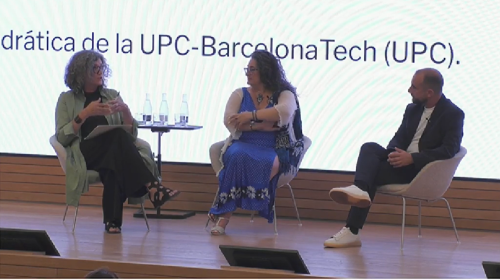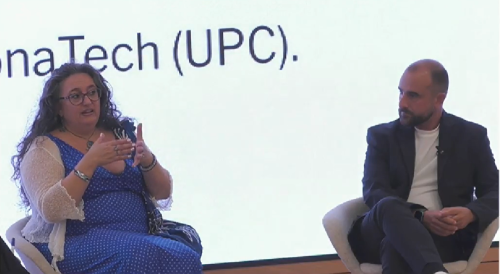In Catalonia, 8.7% of the professionals who work in the field of technology are women. If 91% of the professionals working in the digital ecosystem are men, it is usual for the technological projects that are developed to be based on a male vision of the world. Would it be a good idea to change that dynamic to avoid gender bias?
The answer is Yes. This is the conclusion of the last meeting of Sabadell Forum on the Trustworthy AI season, which was attended by Karina Gibert, professor at UPC-Barcelona Tech and advisor to the European Commission on artificial intelligence (AI) matters, and the director of Banco Sabadell's Analytics and Artificial Intelligence Community, Alesander Gómez. They discussed the risks and opportunities of gender diversity in AI, in an event moderated by the Director of International Legal Advice and member of the SWING collective, Esther Nin.
In an interview published on 20 October in El País, the former director of AI at Google and founder of Diverse AI, Toju Duke, regretted that the debate on artificial intelligence has focused on the danger to humanity's existence that its use entails, when the real problem, from her point of view, is that today this tool discriminates against the population and amplifies systemic injustices that should have been eliminated.

One of these injustices is the existence of bias. Karina Gibert and Alesander Gómez focused on how gender bias impacts on AI. The fact that there are women who do not have the option of access to credit, a job or social welfare benefits, to name a few examples, may be determined by technological systems whose algorithms have been fed by biased data. This point was made by Karina Gibert: "The data are already biased from the bottom up. It is very important to monitor which universe an AI has to act on and ensure that we are feeding it with data that represents all the segments that are in that universe. We have slipped up on something that is actually a part of AI itself: Why haven't we been concerned about the reliability of the data samples, which is what feeds the algorithms? This is a well-known problem". A problem that must be addressed with an appropriate work ethic and a global European regulation that protects the rights of users and at the same time does not restrict the capacity for development and innovation so as not to lose competitiveness with the AI models that are being developed in the US and China. "Ethics," Karina Gibert stressed, "goes beyond bias, because we are talking about people's rights, privacy, equal opportunities, among many other things. You can launch a product that's legal, but not ethical. That is why we have to go beyond what the law indicates. There will be a part of the ethical model that will be regulated, but there will be another part that will remain as a recommendation”. In this regard, Alesander Gómez added that it is also important for society to acquire a digital awareness or digital culture, which claims its rights and for this he asked that each person who interacts with AI be interested in knowing how AI impacts their privacy.

However, to avoid gender bias, it is not enough to have an ethical model and good regulation. For this reason, the two participants of Sabadell Forum explored the proposition that women should be encouraged to take up more of the technological space and show more interest in STEM professions. Technology must be feminised. And it is not only good for achieving equity in the system, but because the results show that companies led by women offer better results than those led by men, as Karina Gibert emphasised: "Various studies indicate that companies run by women entrepreneurs, especially in the technological field, record higher profits, in the order of 4%, than those that are led by men. Women's leadership in these areas, which tend to be more collaborative, produces more productive dynamics".
Karina Gibert: "Women who are in technology have to let ourselves be seen; girls need female role models"
Faced with this reality, the key question is: What needs to be done to make women feel seduced enough to bet on a technological career? For the professor at UPC-Barcelona Tech, it is a very multifaceted topic that covers the entire chain of a woman's vital development. Because everything starts, she said, from an ancestral and patriarchal vision in terms of the role of women in life is to take care of others, whether in the family, educational, institutional or media spheres. In her opinion, this stereotype must be broken and she considers it essential that girls have female role models. "Those of us who are here," Karina Gibert pointed out, "have to let ourselves be seen. It is important that women in the sector and those in leadership positions come out and explain themselves. We can do many things, such as building women's networks, just as the women managers of Banco Sabadell have done by creating the SWING collective to identify gender deficits". For this reason, both Karina Gibert and Alesander Gómez agreed that it is necessary for both men and women to have gender sensitivities to build a more representative, equitable and just world.
These were some of the topics discussed in the Trustworthy AI season organised by the Department of Analytics and Artificial Intelligence within the framework of Sabadell Forum and which on this occasion had the collaboration of the SWING collective.
If you want to see the full session click.here.